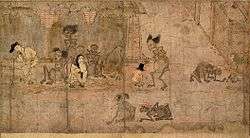餓鬼
See also: 饿鬼
Chinese
| to be hungry; hungry | ghost; sly; crafty | ||
|---|---|---|---|
| trad. (餓鬼) | 餓 | 鬼 | |
| simp. (饿鬼) | 饿 | 鬼 | |
Pronunciation
Noun
餓鬼
- hungry person
- (derogatory) pig
- (Buddhism) hungry ghost; one of the six realms of reincarnation in Buddhist cosmology
- the spirit of a jealous or greedy person who, as punishment for mortal vices, has been cursed with an insatiable hunger
Japanese
Etymology 1

| Kanji in this term | |
|---|---|
| 餓 | 鬼 |
| が Grade: S |
き Grade: S |
| on’yomi | |
Borrowing from Middle Chinese compound 餓鬼 (MC ŋɑH kʉiX, “hungry + ghost”). Compare modern Min Nan reading gō-kúi. The Chinese term derives from the importation of Buddhism into China, as a translation of Sanskrit प्रेत (preta).
Pronunciation
Noun
餓鬼 (hiragana がき, rōmaji gaki)
- (Buddhism) short for 餓鬼道 (gakidō): the hungry ghost realm, one of the six realms of reincarnation in Buddhist cosmology
- (Buddhism) a preta: the spirit of a jealous or greedy person who, as punishment for mortal vices, has been cursed with insatiable hunger
- (Buddhism) the souls of the dead who languish in oblivion without any surviving relatives to pray for their peace
- (figuratively) anyone who is constantly hungry or thirsty
- (figuratively) anyone who is unhealthily thin and appears as if they are starving
- (archaic) Short for 餓鬼病 (gakiyami, gakibyō, “leprosy”).
- (derogatory, slang, by extension from the sense of someone who is always hungry) an unpleasant child, a brat
- 2000 August 10, Andō, Yūma; Asaki, Masashi, “
BREAK .39痛 恨 の国 光 ‥ [BREAK.39 When Kunimitsu Has Remorse‥]”, in サイコメトラーEIJI [Psychometrer EIJI], volume 24 (fiction), Tokyo: Kodansha, →ISBN:- でも——可愛いですね このジンガイのガキ
- Demo—— kawaii desu ne kono jingai no gaki
- However—— this crooked brat’s pretty cute, don’t ya think
- Chih rorikon ga
- Yeesh, you pedophile
- でも——可愛いですね このジンガイのガキ
- 2000 August 10, Andō, Yūma; Asaki, Masashi, “
喧 嘩 屋 国 光 [Kunimitsu, Brawl Delivery]”, in サイコメトラーEIJI [Psychometrer EIJI], volume 24 (fiction), Tokyo: Kodansha, →ISBN:- 死ねや ガキィ〰〰‼
- Shine ya gakī~~‼
- Drop dead, you son of a bitch〰〰‼
- 死ねや ガキィ〰〰‼
-
Usage notes
This is an example of a word that can be spelled with katakana to convey an informal conversational tone. The slang sense in particular is often encountered in katakana, as ガキ.
Etymology 2
| Kanji in this term | |
|---|---|
| 餓 | 鬼 |
| が Grade: S |
き > っき Grade: S |
| on’yomi | Irregular |
Shift in pronunciation of gaki above. Gemination is a common form of emphasis in the process of Japanese word formation. The meaning of brat is by extension from the original sense of gaki above, referring to someone who is always hungry.
Alternative forms
Usage notes
Often spelled in hiragana.
This article is issued from
Wiktionary.
The text is licensed under Creative
Commons - Attribution - Sharealike.
Additional terms may apply for the media files.